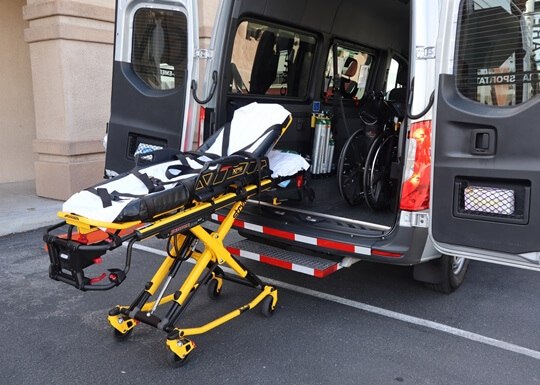Enhance Accessibility with Specialist Medical Transportation Services Near Me
Enhance Accessibility with Specialist Medical Transportation Services Near Me
Blog Article
Obtainable and Affordable Medical Transportation Options for Seamless Health Support
In the world of health care, the accessibility and affordability of medical transport are extremely important in making sure people can access the care they require when they need it. The capacity to effortlessly browse transportation alternatives can considerably influence a person's ability to obtain prompt clinical attention, follow-up treatment, and total well-being. From non-emergency clinical transport services to ingenious remedies like telehealth, the landscape of medical transportation is developing to satisfy the varied needs of individuals. Taking into consideration the relevance of this element in medical care distribution, discovering the selection of alternatives readily available comes to be important for attending to gaps in access and cost.
Non-Emergency Medical Transport Services

These solutions are staffed by trained specialists who focus on client convenience and security during transportation. Vehicle drivers are outfitted to deal with individuals with varying clinical needs and ensure that all trips are smooth and hassle-free - Medical Transportation Services Near Me. In addition, non-emergency medical transportation solutions typically use specific automobiles that are wheelchair-accessible, making them appropriate for a vast array of individuals with various movement needs
Volunteer Motorist Programs
Volunteer driver programs are instrumental in supplying transportation aid for people looking for non-urgent healthcare. These programs depend on the generosity of volunteers that donate their time and cars to aid transportation people to and from medical visits. By using volunteer chauffeurs, companies can use a cost-effective solution for people who might not have access to reliable transport.
Among the essential benefits of volunteer driver programs is the customized care and attention that individuals get. Unlike typical transportation solutions, volunteer drivers commonly develop a rapport with the people they assist, creating a supportive and thoughtful environment throughout what can be a difficult time. Furthermore, volunteer motorist programs can aid connect the gap for individuals residing in underserved or rural locations where mass transit options might be limited.
Public Transport Options

Among the crucial benefits of mass transit is its prevalent accessibility in country and urban locations alike. This comprehensive network permits patients from diverse histories to travel to medical appointments with loved one convenience. Additionally, public transport systems are usually outfitted to accommodate individuals with disabilities, providing obtainable travel choices for those with wheelchair obstacles.

Ride-Sharing and Transport Network Business
The development of modern-day transportation alternatives for clinical objectives expands beyond traditional public systems like see post buses and trains to incorporate the innovative world of ride-sharing and transport network business. Ride-sharing solutions such as Uber and Lyft have reinvented the method people travel to clinical appointments, using comfort and versatility to patients who might not have accessibility to their automobiles or typical mass transit. These platforms enable users to ask for official source a ride with the touch of a button on their smartphones, providing door-to-door service that can be specifically valuable for people with movement obstacles or those requiring help.
Transportation network business (TNCs) have actually additionally played a substantial role in linking the gap in clinical transportation services. Companies like Veyo and RoundTrip concentrate on non-emergency medical transport, providing to people that need a greater degree helpful during their journeys to clinical facilities. By partnering with doctor and insurance firms, TNCs make certain that patients can access prompt and trustworthy transportation options, eventually contributing to improved wellness results and individual satisfaction.
Telehealth and Digital Consultations
Enhancing medical care access and benefit, telehealth and virtual consultations have arised as pivotal components in modern medical methods, revolutionizing the method individuals communicate with doctor. Telehealth leverages modern technology to promote remote communication in between people and health care specialists, providing a broad selection of solutions such as digital assessments, remote tracking, and digital prescriptions. Virtual assessments allow individuals to seek clinical recommendations, diagnosis, and treatment from the comfort of their homes, eliminating the demand for physical brows through to healthcare centers. This approach not only conserves time and decreases transport expenses for clients however also enhances the total performance of health care distribution.
In addition, telehealth plays a vital function in prolonging medical services to underserved neighborhoods, backwoods, and people with restricted flexibility. By damaging down geographical obstacles and enhancing healthcare outreach, telehealth promotes very early treatment, connection of treatment, and individual interaction. As technology continues to advance, telehealth is positioned to play a progressively considerable duty in shaping the future of health care delivery, cultivating enhanced health and wellness end results and client satisfaction.
Conclusion

From non-emergency medical transport solutions to cutting-edge solutions like telehealth, the landscape of clinical transportation is developing to fulfill the varied demands of individuals.Non-Emergency Medical Transport Provider help with the prompt and secure transport of individuals needing non-urgent medical care to and from medical care centers.The advancement of contemporary transportation choices for medical objectives expands beyond typical public systems like buses and trains to include the innovative world of ride-sharing and transportation network business.Transport network firms (TNCs) have actually also played a significant duty in bridging the space in clinical transportation solutions. Non-Emergency Medical Transportation Providers, Volunteer Chauffeur Programs, Public Transportation Options, Ride-Sharing and Transport Network Firms, and Telehealth and Virtual Consultations all play an important role in resolving transport barriers to health care accessibility.
Report this page